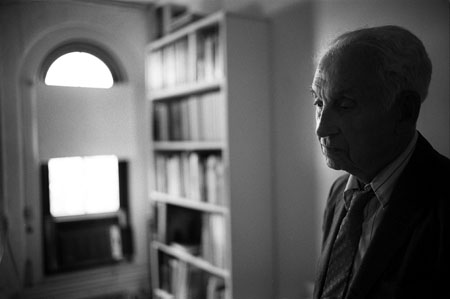The Big Picture: Ernst Mayr
Evolutionary biologist

Although he is 97 and only comes into his Harvard office once a week, Ernst Mayr is far from retirement.
Mayr, Harvard’s Alexander Agassiz Professor of Zoology, Emeritus, recently traveled to Berlin, where his alma mater honored him on the 75th anniversary of earning his Ph.D. This fall, he will publish two new books: “The Birds of Northern Melanesia,” with Jared Diamond, and a mid-level textbook, “What Is Evolution?” His coffee table is heaped with professional journals to read and books to review.
“A scientist never retires, because he is in love with his work,” says Mayr. With faculty committees and student exams behind him, he says, a scientist “can concentrate full time on his research and a little enjoyment of life.”
Mayr began his career as an ornithologist, leading expeditions to New Guinea in the late 1920s before leaving his native Germany for the United States in 1930. After two decades at the American Museum of Natural History in New York, he came to Harvard in 1953 and his work shifted into evolutionary biology. Along the way, he’s published 23 books and picked up the “triple crown” of biology (the Balzan Prize, the International Prize for Biology, and the Crafoord Prize) and the National Medal of Science.
In 1995, Harvard named its Ernst Mayr Library of the Museum of Comparative Zoology after the man that Harvard colleague Stephen Jay Gould has called “the greatest living evolutionary biologist.”
Neither his decorated professional history nor his mastery of evolutionary biology provides Mayr with the secret to his long life. “If only I knew it, I could become very rich by selling this information!” he says. Instead, he ticks off a familiar list of virtuous habits: he gave up smoking in his 30s, takes daily long walks, eats a sensible diet, and takes vitamins. He travels to Florida in the winters and takes weekly birding excursions out of Rollins College there. “Birds are still very much my hobby,” he says.
“I have worked hard all my life, and I think that’s part of the answer,” he adds. “The other part is … I am never depressed, I am somewhat optimistic, at least for the near future, I never complain about things, and I’m always forward-looking about my life. I have what the psychologists would probably consider the right kind of attitude toward life.”
We serve the public interest! Interesting people, interesting jobs, interesting hobbies – we want them in the Big Picture. If you have an idea for the Big Picture, give us a buzz at big_picture@harvard.edu




